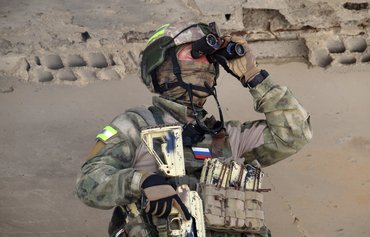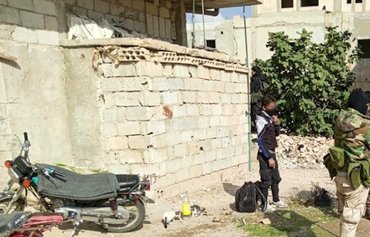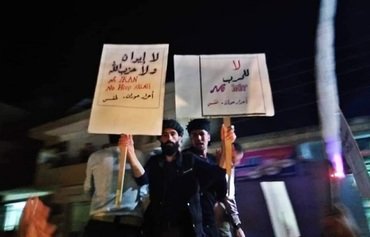The Islamic Revolutionary Guard Corps (IRGC) is systematically killing all opponents of its expansion in Syria's Daraa province as part of Iran's ongoing attempts to control the southern part of the country, Syrian activists told Al-Mashareq.
Assassinations have targeted well-known figures in the southern province that borders Jordan, they said, and villages and towns that have rejected the Iranian presence have been shelled or are under siege.
Intensive militia activity and movements have been observed over the past few months, Daraa activist Jumaa al-Masalmeh told Al-Mashareq, involving Brigade 313, al-Hadi Battalion, al-Ghaith Forces, the Syrian regime's 4th Division and Liwa Usud al-Iraq.
In an alarming new development, Fatemiyoun Division militiamen also have begun to arrive in the vicinity of the town of Daraa al-Balad, he said, with more than 350 Afghan militiamen under the supervision of Iranian officers.
![Sheikh Fadi al-Asimi (seated behind ottoman), seen here in a photo published July 13, 2021, was assassinated in Daraa for rejecting Iranian expansion in the region. [Zaytouna Magazine]](/cnmi_di/images/2022/09/22/37244-daraa-leader-assassination-600_384.jpg)
Sheikh Fadi al-Asimi (seated behind ottoman), seen here in a photo published July 13, 2021, was assassinated in Daraa for rejecting Iranian expansion in the region. [Zaytouna Magazine]
![A Fatemiyoun Division element (centre) poses with two Iraqi militiamen in Daraa city in a photo posted August 25. [Mohammad Asakra Twitter account]](/cnmi_di/images/2022/09/22/37245-Fatemiyoun-division-daraa-600_384.jpg)
A Fatemiyoun Division element (centre) poses with two Iraqi militiamen in Daraa city in a photo posted August 25. [Mohammad Asakra Twitter account]
"This expansion coincides with the growth of opposition to the Iranian presence, as many leaders have been assassinated in the region," al-Masalmeh said.
Among them are Sheikh Fadi al-Asimi, former Syrian opposition leader Khaldoun al-Zoubi, and "six other people who refused to join the sectarian militias or deserted from them", he said.
Daraa residents are in a state of tension, fearing the assassinations will continue, he said, especially in light of the recent shelling of Daraa al-Balad and Tafas because of "their residents’ open opposition to the Iranian presence".
Syrian regime forces are taking part in the siege and shelling alongside the IRGC-aligned militias, he said.
Shrinking Russian influence
"It has become clear that the IRGC has set its sights on taking control of the entire southern Syria region, especially given the shrinking of the Russian influence because of the Ukrainian war," said Syrian lawyer Bashir al-Bassam.
Russia invaded Ukraine February 24.
The IRGC is "being assisted in this regard by combat and security groups affiliated with the Syrian regime", he told Al-Mashareq.
In examining events over the past period, he noted, one can see that Iran has been nibbling at Daraa province since it entered in 2014.
During the past two years, "Afghan and Lebanese militias began to appear alongside the local militias," he said.
More recently, local leaders, who find it "impossible to accept this presence", have become targets of these IRGC-backed militias, al-Bassam said.
Iran is seeking to establish a central military base in Daraa al-Balad, he said, most likely in the vicinity of the military security building, as it prohibited local militias from approaching the building after the arrival of Afghan militiamen.
The mission of the new Malik al-Ashtar base will be to take control of the entirety of the Daraa-Quneitra-Damascus triangle, he added -- in other words, the entirety of southern Syria.
Tension in southern Syria
"Iran is using every means to expand its presence in southern Syria," Sweida-based activist Nizar Bou Ali told Al-Mashareq.
It is "playing on the sectarian tension between the Sweida and Daraa areas, where kidnappings for ransom are frequent and many cases have ended in death because of the inability of the families to pay the ransom".
Eventually it became clear that the gangs that carry out these acts are "funded and protected by the IRGC and receive direct orders from it", he said.
"They comprise members of the many militias deployed in the region."
"Had it not been for the wisdom and calm of the tribal leaders and elders in the two regions, things would have taken a very bloody turn," he added.
"It became apparent who benefits from these operations, namely, the IRGC, which exploited the tension to penetrate deeper into both regions," he said.
The IRGC also benefits from the area's burgeoning drug trade, Bou Ali said.
"Captagon pills and hashish are widely and openly sold in both regions," he said, adding that according to Daraa-based activists, the main dealers are "protected by the Iranian militias, just as they are in Sweida".

![Rani Jaber, commander of the IRGC-aligned al-Hadi Battalion in Daraa, is seen here in a photo posted online on August 14. [Horan Free League]](/cnmi_di/images/2022/09/22/37243-al-Hadi-battalion-600_384.jpg)






